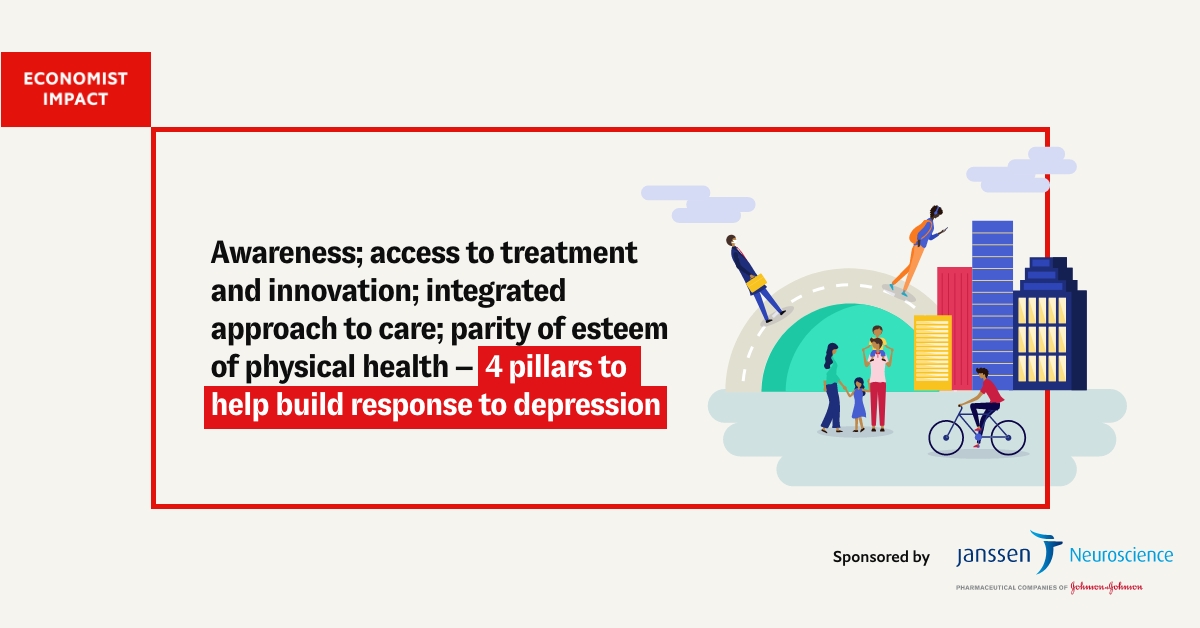New Economist Impact Report examines depression in Europe and describes what good care could look like over the next decade

Mental health disorders are on the rise. And the COVID-19 pandemic has only made things worse. According to the Organisation for Economic Cooperation and Development (OECD), the prevalence of depression in 2020 more than doubled in many European countries compared with the year before[1].
Which, of course, presents a huge challenge. For many healthcare systems, budgets are already stretched. But it’s crucial that they are sufficiently resourced to address both physical AND mental health conditions.
In a newly published and Janssen-sponsored report, Economist Impact (EI) examines the burden of depression across Europe, and describes what good care could look like over the next few years.
‘Depression in Europe: building resilience through raised awareness, improved access, integrated care and parity of esteem’ garnered insights from eight countries: France, Germany, Italy, Spain, the UK, the Netherlands, Denmark and Slovenia.
The report focuses on four thematic areas:
- Awareness, including patient empowerment and improved community recognition of depression as a serious condition
- Access to treatment and innovation, including both nonpharmacological and pharmacological measures
- Integrated approach to care, including prevention measures and a co-ordinated support system for patients’ physical health, mental health and wider social needs
- Parity of esteem with physical health and the need for support across the entire patient journey, including prevention, early detection, education and support at the workplace and in the community
Each thematic chapter concludes with recommendations for effective and resilient care systems going forward.
Janssen welcomes the EI’s suggestions and key takeaways, which – in summary – are:
- Adaptability – healthcare systems need to remain adaptable as rates of depression are rising in most European countries, particularly among the young
- Awareness and stigma – despite many positive efforts, there remains a strong stigma around depression, so even more awareness is required to overcome this
- Integrated systems – healthcare systems should be integrated on all levels, leading to care delivery that is more efficient and resilient
- Increased support – more support is needed to get people treatment, whether through digital health, talking therapies, or other therapeutic or diagnostic innovations
- Inclusive treatment – family and carers should be included in treatment plans.
These recommendations offer useful focal points for policymakers as they look to build effective mental healthcare systems. Achieving mental health gains will require committed and sustained efforts, and it’s a challenge we simply must meet.
You can find a full copy of the report at the Economist Impact hub
The hub also features an infographic, an interactive executive summary, and a webinar entitled ‘Tackling Europe’s mental health crisis’, for which I joined a panel of speakers from the WHO, the European Commission and the European Psychiatric Association to discuss what can be done to address the burden of depression on patients, caregivers and society.
REFERENCES
[1] OECD. Tackling the Mental Health Impact of the COVID-19 Crisis: An Integrated, Whole-of-Society Response. Paris: Organisation for Economic Co-operation Development, 2021. Available from: https://www.oecd.org/coronavirus/policy-responses/tackling-the-mental-health-impact-of-the-covid-19-crisis-an-integrated-whole-of-societyresponse-0ccafa0b/.


